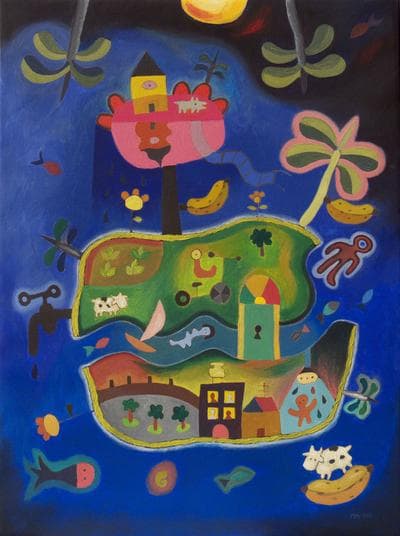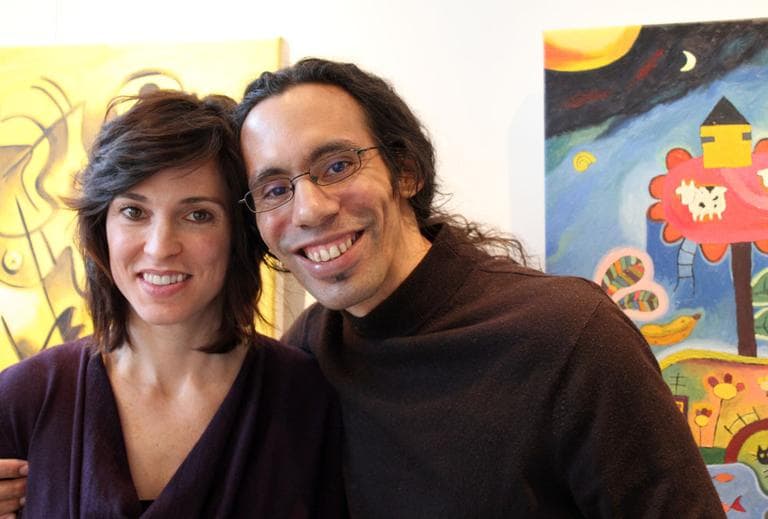Advertisement
Policy Change Fosters Flow Of Cuban Artists To Boston
ResumeBOSTON — Bringing Cuban artists to the U.S. was unthinkable a few years ago. But restrictions on cultural exchanges between the long-conflicted countries have eased over the past year or so. Now a Boston gallery that deals exclusively in Cuban art is hosting one painter's first trip to America.
When I dropped by La Galeria Cubana in Boston’s South End, Luis Rodriguez Noa — 40 years old, bright eyes, hair pulled into a pony tail — crouched down to staple an unfurled canvas against a wooden frame. It's one of 30 paintings he had to roll up, store in tubes, and transport himself on his flight to Boston. Shipping between Cuba and the U.S. is prohibited, and Rodriguez Noa admitted carrying that precious cargo stressed him out.
"I was worried all the time, all the time about the airplanes,” he said, “and how they handle it, and if they’d arrive on time or if I would lose my luggage.”
Rodriguez Noa's relieved to finally be here, installing a vibrant piece called “Shortcut to Prosperity” with the help of gallery associate Carlos Escobar.

“It’s representing an island — I come from an island,” Rodriguez Noa clarified, with a laugh, “and it’s a colorful painting of this island in the middle of the sea.”
The lush blues and greens evoke life over there, according to the artist. “It’s active all the time, people moving around and having a lot of dreams."
For Rodriguez Noa, being able to travel to the U.S. is like a dream come true.
”It’s very important to me because I’ve been traveling to Europe many times, but this has been kind of a difficult destination, I could say.” Then, after a short pause and another laugh, “for the reasons that everybody knows.”
He’s talking about the 1960s-era U.S. embargo against Cuba. But restrictions on artist visas and cultural exchanges have shifted over the years along with political tides. Tightening under President Reagan. Loosening under President Clinton. Constricting with President W. Bush. Now the Obama administration has been relaxing policy again.
“Artists flow like water all across the planet,” Boston photographer David Davison said to me in his Cambridge home. “Just this interconnection of materials and ideas that flow freely, regardless of embargoes or not, they just flow.”
Davison has been to Cuba many times for his own exhibitions, but also on educational trips with his students at the School of the Museum of Fine Arts. Frequency depends on how porous the borders are at any given time. This past January Obama announced additional policy changes to facilitate educational travel, and Davison is thrilled. He’s old enough to remember the Bay of Pigs and has lots of friends in Cuba. The photographer also acknowledges how volatile the topic of Cuban-American politics can be. In terms of cultural exchanges, though?
“Coming from the artistic side it’s just in general a non issue,” he said.
That depends on where you live. In Miami the Cuban exile community was outraged when musician Sylvio Rodriguez — a Castro loyalist — was granted a visa to perform in the U.S last year. At the end of this month a jam-packed Cuban arts festival is scheduled in New York, so we’ll see how that goes.

But, no matter how or for what reason, getting Cuban artists into the U.S. can still be a logistical nightmare. Just ask Galeria Cubana director Michelle Wojcik.
“One of the challenging things about bringing the artists here is that it takes quite a while to figure out whether they got the visa issued by the U.S.,” she explained, “so it’s very difficult to make an exhibition schedule far in advance.”
She wasn’t sure about Rodriguez Noa’s arrival date until four weeks before the show was supposed to open. That’s why they’ve had to scramble to get his artwork prepped and hung on the gallery walls.
But it’s worth it, Wojcik confirmed enthusiastically. Rodriguez Noa is the third Cuban artist she’s hosted in recent months.
“People are very, very curious about life on the island,” she said. She explained she observed this in her former life as a researcher at the World Policy Institute’s Cuba Project. On her trips to the island she fell in love with the artwork and decided to open a gallery in the states — first in Provincetown four years ago, then she expanded into this Boston space two years later. Wojcik holds one of just 30 U.S. licenses that allow her to travel to Cuba to find artists there and represent them here.
“Selling artwork is one of the few things they can do as private enterprise in Cuba, so I know I can generate income for people,” she said, “and that I can bring something very interesting to Boston and Massachusetts.”
And the gallery director said people are buying — although transactions are tricky because no banking is allowed between the U.S. and Cuba. And, because there’s no shipping, she, like Rodriguez Noa, brings artwork back from Cuba in her luggage. Each piece — and she usually transports anywhere between 100 and 125 of them — has to be thoroughly checked over by customs officials. Wojcik will go through that again when she flies to Cuba in two weeks.
She said she can’t wait. Even with all the hoop-jumping, she feels a deep connection to Cuba and the people she's met there.
And remember how Wojcik said Americans are curious about life on the island? Rodriguez Noa added this:
“Cuban people like American people. We understand your jokes, in the movies. We understand your literature, I love Mark Twain, Hemingway. I mean, you have so talented people and I’m honored to be here and to be able to show my work in the country where they were born.”
A country, the artist reminded me, that’s only 90 miles away from his.
